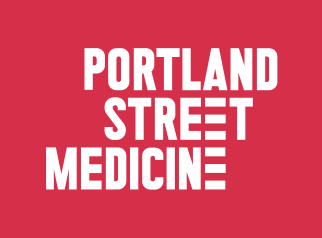The statistics are staggering
Nationally, Oregon has the fourth highest rate of homelessness in the nation.
In recent years Portland’s chronic homelessness has increased at twice the national rate. According to Multnomah County’s 2022 Point-In-Time Count (a one-night, county-wide effort to capture details about houseless people living here), there are 5,200+ people experiencing homelessness in Portland, a 30% increase from 2019. Over 80% of unsheltered houseless people, like all of our patients who truly live on the streets, report living with at least one disability; 40% report having a severe mental health disorder; and 37% report a substance use disorder (SUD).
5,200+
Number of people who experienced homelessness in Multnomah County on a single night in January 2023.
47 Years
The life expectancy of a homeless person can be 20 years shorter than their housed counterpart.
80%
Percentage of homeless Portlanders who report a chronic disability.
6,000+
Care engagements PSM will have with patients this year.
Homeless folks in our community face stigma, social isolation, and loss of relationships. They suffer a disproportionate burden of illness and premature death. The life expectancy of a homeless person is a shockingly low 47 years. The daily struggle for food, shelter, clothing, and safety relegates health to a low priority, which in turn increases health risks, exacerbates chronic conditions, and complicates treatment. Infections, injuries, and other acute conditions go untreated; and communicable diseases such as tuberculosis, AIDS, and viral hepatitis readily spread. Houseless people in our community are structurally marginalized and suffer a disproportionate burden of illness and premature death, largely from conditions like these that are treatable or preventable. Nearly all our patients have had traumatic experiences with mainstream medicine, which adds fear and mistrust to the many barriers for accessing care. To improve health outcomes for this population, care options must include relational street-based and trauma informed care, including public health harm reduction and health education services that open a window for further engagement. In response to this need we are unique in the Portland Metro region as the only provider of this type of outreach and engagement, offering a strong net of wrap around services.
Portland Street Medicine is based on two proven strategies that can quickly improve the health of people experiencing homelessness: access and continuity. Those without access to healthcare are at increased risk for later-stage diagnosis of disease, poor control of manageable conditions (e.g. hypertension, diabetes), and hospitalization for preventable conditions. And without continuity, the trust that is necessary to make change over time is impossible to gain. The three most common causes of death— overdose, cancer, and heart disease—are either preventable or treatable in the traditional health care setting. Addressing the health care issues of homeless people is perhaps the greatest health equity challenge of our time.


